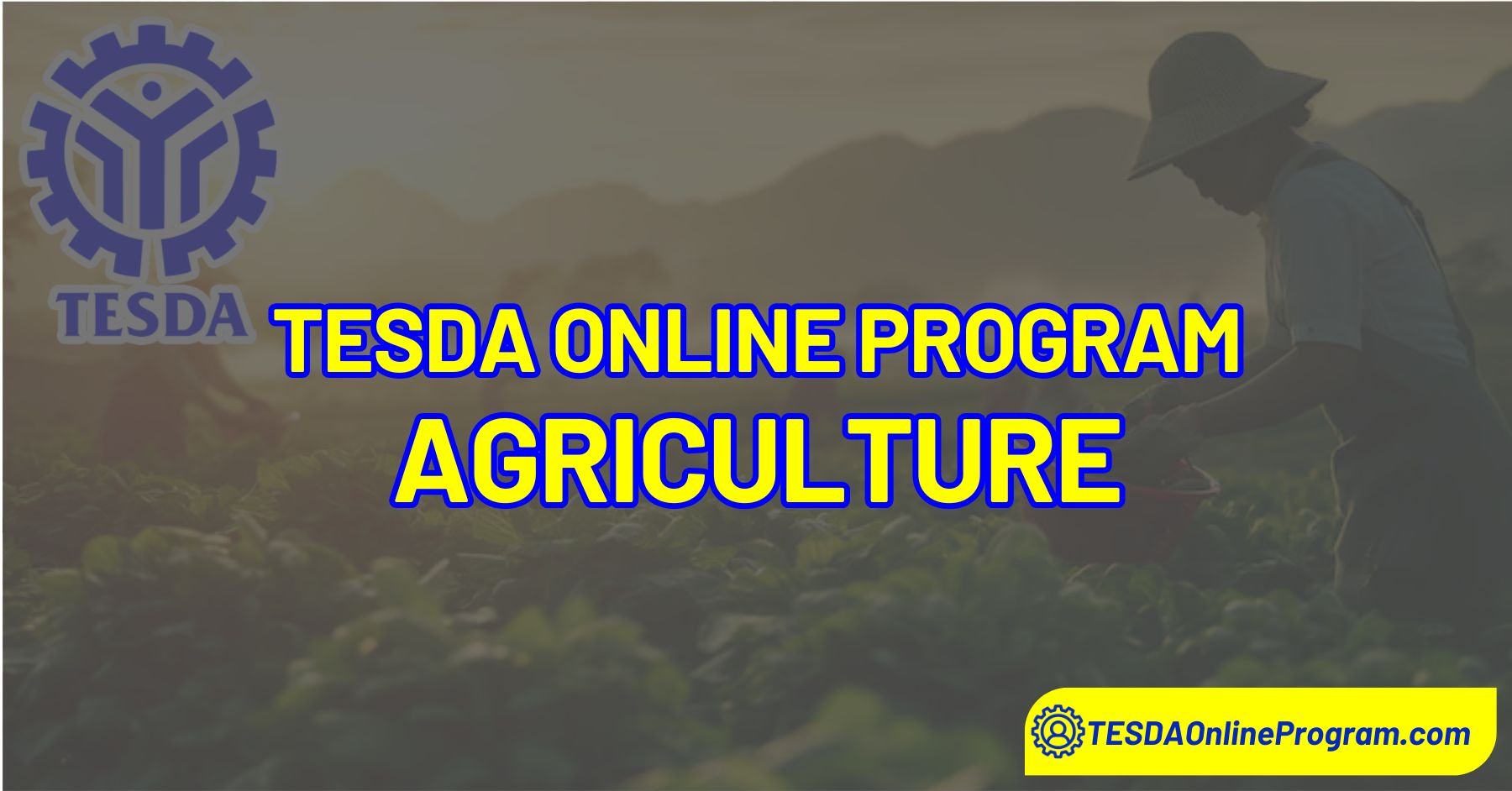Are you passionate about agriculture and looking to expand your skills? TESDA Online Program (TOP) offers a range of agriculture courses designed to help you grow your knowledge and expertise in the field. Whether you’re interested in organic farming, aquaponics, or crop production, these courses provide practical, industry-relevant training to equip you for success in the agricultural sector. With TESDA’s commitment to accessible and high-quality education, you can learn at your own pace and gain valuable certifications to boost your career opportunities.
Also read: TESDA Digital Agriculture Level II Course
The available courses include Agro-Entrepreneurship NC II, Aquaponic Food Production, Organic Agriculture Production NC II, Agricultural Crops Production NC II, and Fruit Growing. Each course is tailored to address specific areas of agriculture, offering hands-on techniques and best practices to enhance productivity and sustainability. Whether you’re starting your own farm, enhancing your skills for employment, or simply exploring a new passion, TESDA agriculture courses are the perfect stepping stone to achieving your goals.
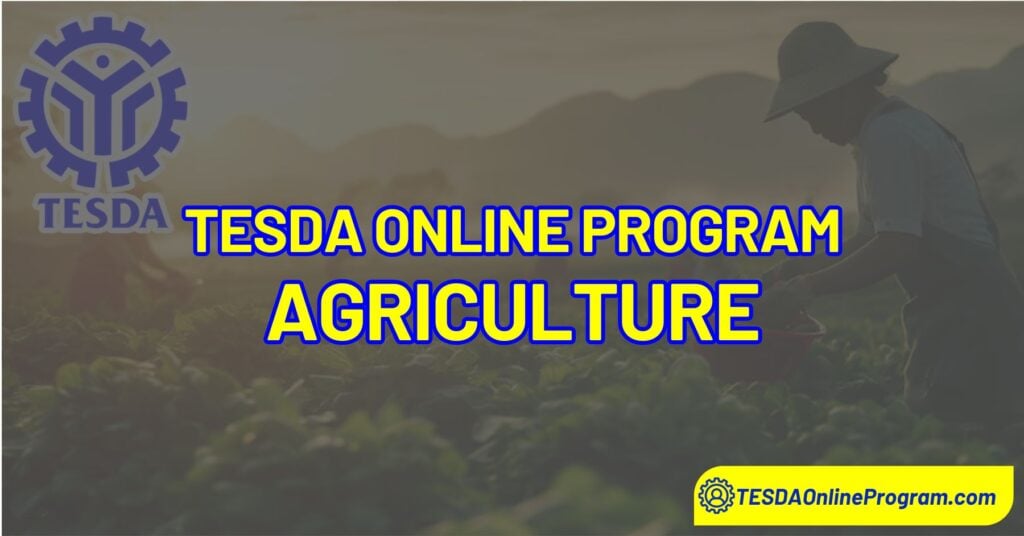
Benefits
Here are some of the benefits of taking the Agriculture Online Courses by TESDA:
- Flexibility: One of the biggest benefits of online learning for agriculture courses offered by TESDA is flexibility. Students can access course materials and lectures at their own convenience, allowing them to balance their studies with other responsibilities such as work or family commitments.
- Cost-Effective: Online courses offered by TESDA are often more cost-effective than traditional classroom-based courses. Students don’t have to worry about additional costs such as transportation, accommodation, or textbooks, making it a more affordable option.
- Self-Paced Learning: With online courses, students have the freedom to learn at their own pace. They can review content multiple times if needed and spend more time on topics that they find challenging. This allows for a more personalized learning experience and can lead to better retention of information.
- Flexible Schedule: Online courses offer flexibility in terms of scheduling. Students can choose to study at any time that is convenient for them, whether it be early morning or late at night. This makes it easier for individuals who have other commitments such as work or family responsibilities to fit education into their busy schedules.
- Diverse Course Selection: TESDA offers a wide range of online courses, allowing students to choose the course that best fits their interests and goals. From technical skills like welding and plumbing to practical skills like cooking and baking, there is something for everyone.
- Develops Self-Motivation and Discipline: As online learning requires self-motivation and discipline to complete the courses, students are able to develop these important skills. This can benefit them not only in their education but also in their future careers.
- Interactive Learning Experience: The online courses offered by TESDA include interactive elements such as videos, quizzes, and simulations, making the learning experience more engaging and effective.
Agro-Entrepreneurship NC II Online Course
Entrepreneurship is in-demand today, especially in agriculture. The TESDA Online Program offers the Agro-Entrepreneurship NC II Online Course, equipping aspiring agri-entrepreneurs with essential skills.
Modules
There are 5 modules in the Agro-Entrepreneurship NC II course, which will help you gain knowledge and skills in agribusiness management. These modules are designed to equip you with entrepreneurial competencies that can be applied in different areas of agriculture and entrepreneurship.
Module 1: Introduction to Agro-Entrepreneurship
This module provides essential knowledge, skills, and attitudes for agro-entrepreneurship. It covers tasks such as market opportunity assessment, farm production planning, financial management, and marketing farm produce.
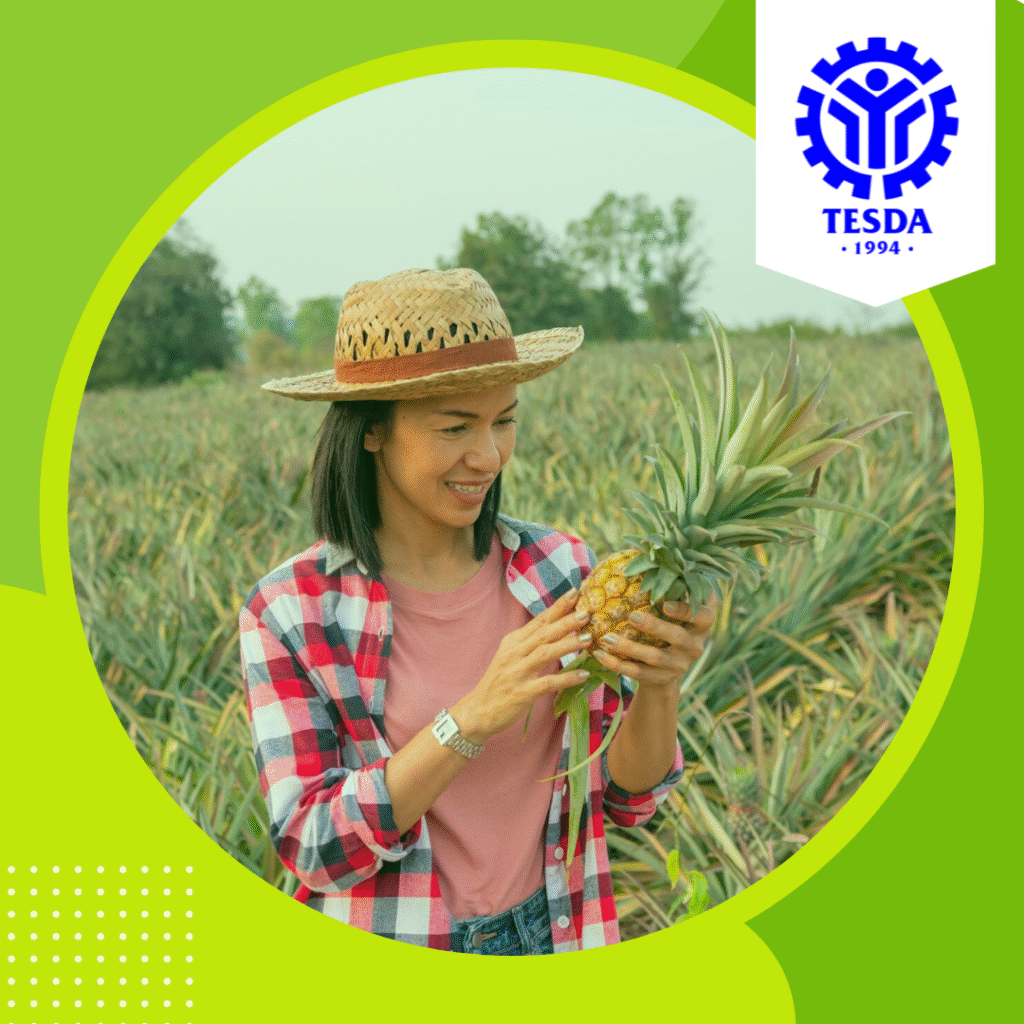
Unit 1: Getting Ready for the Workplace
Lesson 1: Working in an Agro-Enterprise
Lesson 2: Communicating in the Workplace
Lesson 3: Professional Work Habits
Upon completion of this unit, the learner will possess the ability to:
- Define agro-entrepreneurship in the Philippine context
- Apply the concepts and principles of effective workplace communication
- Identify important work-related documents
- Enumerate the characteristics and skills of an agro-entrepreneur
- Set and meet work priorities
- Identify ways to maintain professional growth and development
- Work as a team member
Unit 2: Fundamentals of Agro-entrepreneurship
Lesson 1: Health and Safety in the Workplace
Lesson 2: Estimation and Basic Calculation
Lesson 3: Customer Service Excellence
Lesson 4: Quality and Ethical Standards
Upon completion of this unit, the learner will possess the ability to:
- Identify hazards in the workplace
- Practice safety measures in the workplace
- Enumerate systems and units of measurement
- Estimate labor requirements and materials in farm activities
- Compute for the cost of undertaking farm activities
- Practice principles of customer service
- Identify standards for quality
- Identify ways to ensure quality
Module 2: Assessing Market Opportunities
This module provides an overview of assessing market opportunities, covering the necessary knowledge, skills, and attitude. It includes an introduction to fundamental marketing concepts and the process of preparing a market plan.
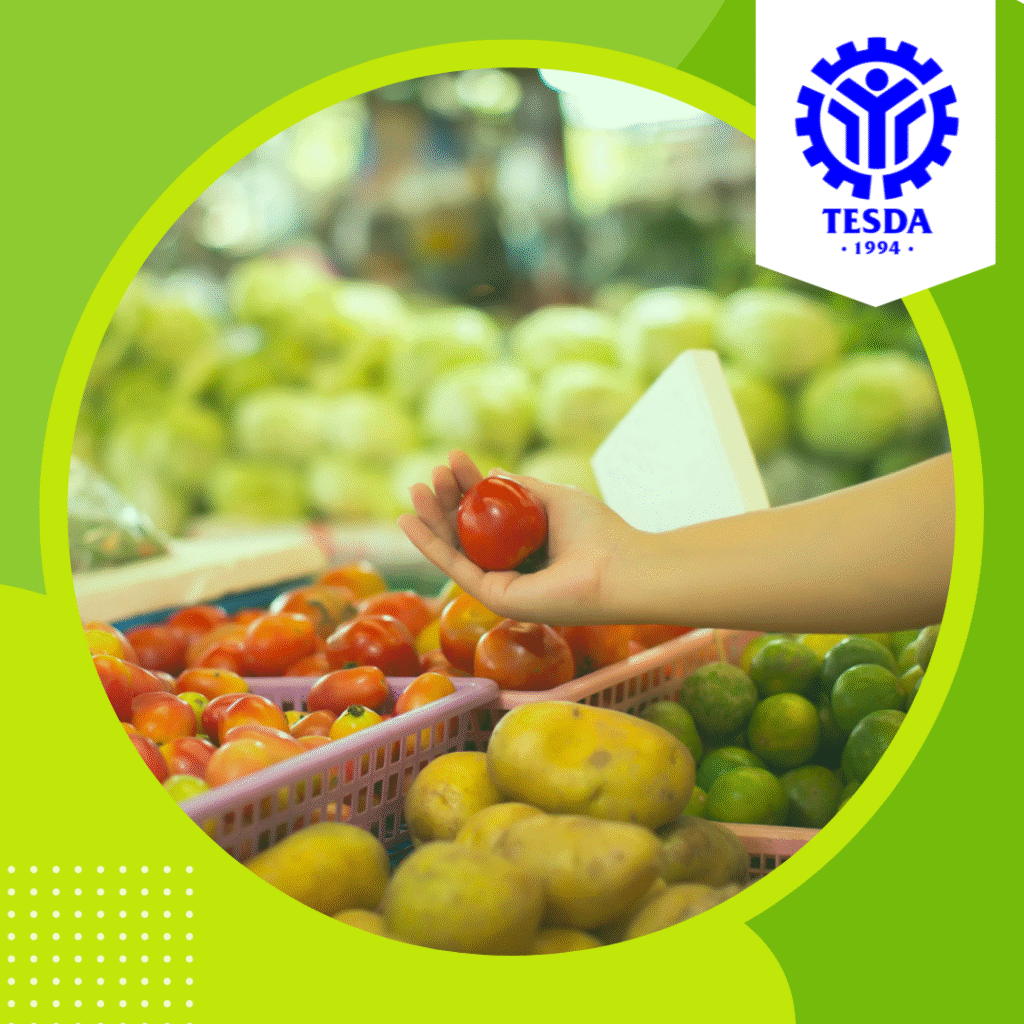
Unit 1: Introduction to Marketing
Lesson 1: Market, Customer, and Product
Lesson 2: The Supply Chain
Lesson 3: Value Creation and Addition
Upon completion of this unit, the learner will possess the ability to:
- Define the terms: market, buyer, and product;
- Explain the concept of supply chain;
- Explain the significance of value creation and addition.
- Enumerate value-adding activities in the supply chain.
Unit 2: Preparing the Market Plan
Lesson 1: Conducting Market Research
Lesson 2: Identifying the Target Market
Lesson 3: Defining the Marketing
Lesson 4: Deciding on a Marketing Strategy
Upon completion of this unit, the learner will possess the ability to:
- Analyze the agro-enterprise through the conduct of a market visit
- Analyze the agro-enterprise through the conduct of internal environment analysis
- Write a SMART marketing objective
- Identify target market through segmentation
- Formulate a marketing strategy for an agro-enterprise
- Formulate a contingency plan for an agro-enterprise
- Create a marketing plan using the provided template
Module 3: Establishing the Farm Production Plan
This module provides an overview of establishing a farm production plan, covering topics such as farm operations, assessment procedures, components of a production plan, supplier selection, and plan review.
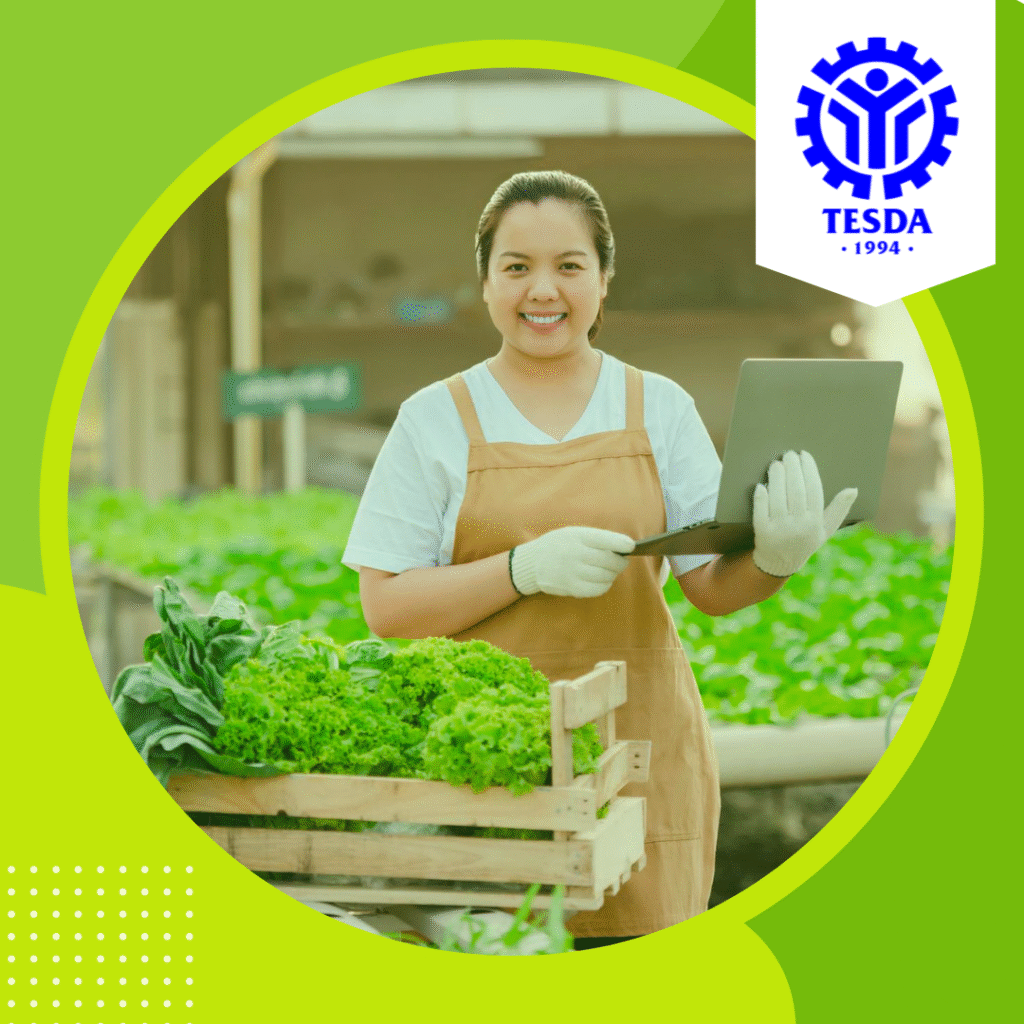
Unit 1: Preparing the Farm Production Plan
Lesson 1: Farm Production Activities and Farm Products
Lesson 2: Conducting Basic Farm Assessment
Lesson 3: Components of a Farm Production Plan
Lesson 4: Selecting Suppliers and Providers for Farm Production
Upon completion of this unit, the learner will possess the ability to:
- Enumerate products and activities for various types of farm operations;
- Conduct a basic farm assessment
- Verbalize vision, mission, and goals for an agro-enterprise;
- Set farm production targets
- Identify farm production requirements
- Compute cost for farm production
- Schedule farm activities
- Create a farm production plan using the provided template
- Select suppliers and providers for farm production based on the Farm Production Plan.
Unit 2: Reviewing and Improving the Farm Production Plan
Lesson 1: Reviewing the Farm Production Plan
Lesson 2: Improving the Farm Production Plan
Upon completion of this unit, the learner will possess the ability to:
- Explain the significance of monitoring and assessing farm production performance
- Describe methods in monitoring and assessing farm production performance
- Give examples of existing standards for farm operations and agro-enterprises
- Demonstrate the adjustment of farm targets based on the assessment of farm production performance
- Apply corrective measures based on the result of the review
- Gather best practices for the improvement of the agro-enterprise
Module 4: Handling Finances
This module provides an overview of financial management in farm production. It covers basic finance terms and principles, as well as topics such as financial service providers, loan and cooperative membership applications. Additionally, it explores investment options for farm operators.

Unit 1: Preparing the Budget Plan
Lesson 1: Basic Terms and Principles in Finance
Lesson 2: Computing the Farm Budget
Upon completion of this unit, the learner will possess the ability to:
- Define basic terms in finance
- Prepare the budget plan
- Compute income, expenses, and profit
- Compute break-even price and yield
Unit 2: Applying for Financial Service Providers
Lesson 1: Financial Service Providers
Lesson 2: Applying for Loans
Lesson 3: Applying for Membership in Cooperatives
Upon completion of this unit, the learner will possess the ability to:
- Identify and select financial service providers;
- Familiarize with loan application procedures and requirements;
- Familiarize with cooperative membership procedures and requirements.
Unit 3: Investing the Farm Income
Lesson 1: Investment Options
Lesson 2: Computing for Investments
Upon completion of this unit, the learner will possess the ability to:
- Familiarize with investment options for the agro-enterprise.
- Define and compute the net income, dividend, patronage refund, and interest on savings
Module 5: Marketing Farm Produce
This module focuses on marketing farm produce, including price monitoring, market selection, marketing strategies, pricing strategies, and product preparation for selling.

UNIT 1: Monitoring the Market
Lesson 1: Determining Major Buyers and Trading Centers
Lesson 2: Price Monitoring
Upon completion of this unit, the learner will possess the ability to:
- Determine major buyers and trading centers for his/her agro-enterprise;
- Enumerate sources of price information;
- Describe data-gathering and recording of price information
UNIT 2: Selling Farm Produce
Lesson 1: Applying Market Strategies
Lesson 2: Preparing Produce for Selling
Lesson 3: Pricing and Selling Farm Produce
Upon completion of this unit, the learner will possess the ability to:
- Identify possible value-adding activities to farm produce
- Identify business development service providers for the agro-enterprise
- Familiarize with marketing arrangements for agro-enterprises
- Describe the common procedures in the preparation of produce for selling
- Compute price for farm produce
- Demonstrate negotiation skills
- Verbalize sales, terms, and conditions for agro-enterprise
- Demonstrate the recording of sales transactions
Note: Upon completion of each module, or specific modules, you will be awarded a certificate to recognize your achievements and demonstrate your expertise in the respective subject matter. These certificates serve as a testament to your dedication and commitment to continuous learning.
Aquaponic Food Production Online Course
Aquaponic Food Production is an innovative and sustainable way to grow food, and TESDA is leading the charge with free online courses through the TESDA Online Program (TOP). These courses cover aquaponics, hydroponics, aquaculture, and sustainable farming techniques, providing insights into food production, water quality, and safety practices. Alongside Aquaponic Food Production,
Modules
There are 3 modules covered in Aquaponic Food Production. These modules will help you understand the basic principles of aquaponics, and guide you on how to set up your own aquaponic system.
Module 1: Introduction to Aquaponic Food Production
This module is the essential course for aquaponic food production. Explore aquaponics, hydroponics, and aquaculture, along with key water quality parameters and occupational health and safety practices in aquaponic farming.
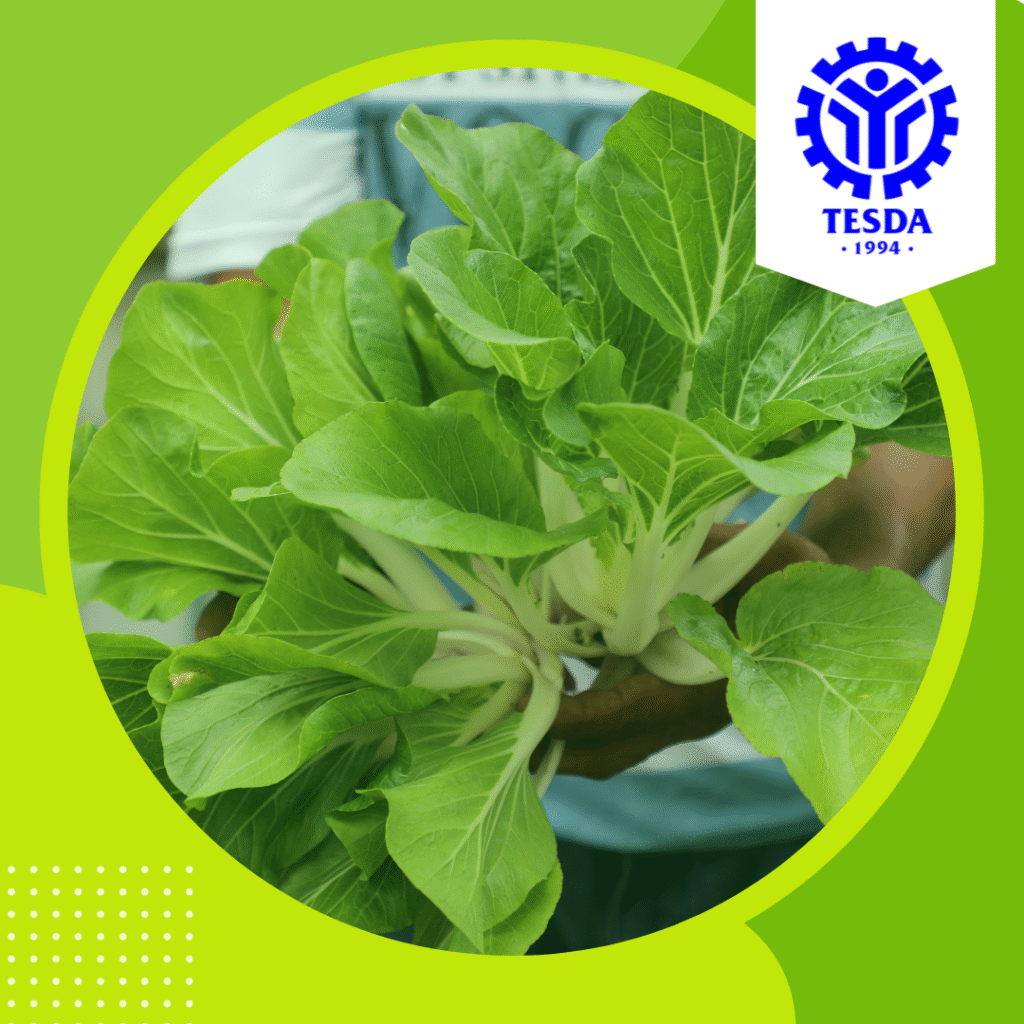
UNIT 1: Defining Aquaponics
Lesson 1: What is Aquaponics?
Lesson 2: Applications of Aquaponics
Upon completion of this unit, the learner will possess the ability to:
- Define aquaponics
- List down the benefits and weaknesses of aquaponic systems
- Describe the significance of aquaponics in food security
- Differentiate small-scale and commercial aquaponics
UNIT 2: Components of an Aquaponics System
Lesson 1: Aquaculture Components of Aquaponics
Lesson 2: Hydroponic Components of Aquaponics
Lesson 3: Balancing the Aquaponic Ecosystem
Lesson 4: Biological Components of the Aquaponic Ecosystem
Upon completion of this unit, the learner will possess the ability to:
- Define aquaculture
- Cite two examples of aquaculture techniques
- Define hydroponics
- Cite two examples of hydroponic systems
- Explain how the nitrogen cycle works
- Enumerate the three biological elements in aquaponics
UNIT 3: Establishing Water Quality in Aquaponics
Lesson 1: Compromised Environment
Lesson 2: Water Quality Parameters
Lesson 3: Sources of Culture Water
Lesson 4: Testing Water Before Use
Upon completion of this unit, the learner will possess the ability to:
- List the five water quality parameters in aquaponics
- Describe how water hardness affects the water
- Enumerate the four aquaponic sources of water
- Explain in detail the two methods of altering pH
- Describe the importance of testing water
UNIT 4: Observing Workplace Health and Safety Practices
Lesson 1: OHS Policies and Procedures
Lesson 2: Maintaining a Safe Aquaponics Environment
Lesson 3: Essential Tools and Equipment
Upon completion of this unit, the learner will possess the ability to:
- Define occupational health and safety
- Identify at least three hazards in the farm
- Cite two food safety guidelines
- Enumerate at least three hand tools or equipment
Module 2: Setting up Aquaponics Systems
This module is the core of the aquaponic food production online course. It assumes you have completed the Introduction course. Discover the science of aquaponics, various aquaponic culture techniques, and gain knowledge on designing and constructing the aquaponics unit!
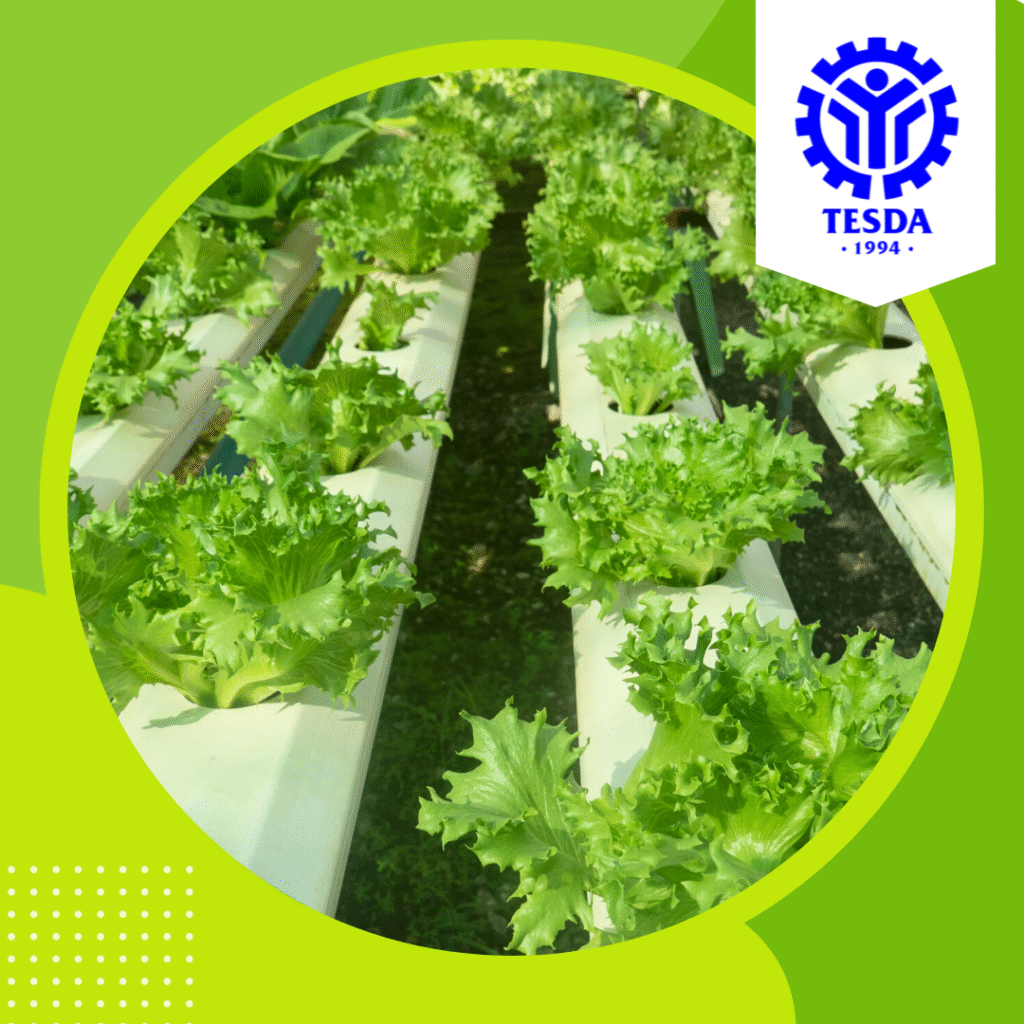
UNIT 1: Comparing Aquaponic Techniques
Lesson 1: Media Bed Technique
Lesson 2: Nutrient Film Technique
Lesson 3: Deep Water Culture Technique
Lesson 4: Assessing the Ideal Aquaponic Technique to Use
Upon completion of this unit, the learner will possess the ability to:
- Describe the dynamics of the three aquaponic techniques
- List the differences between the three aquaponic techniques
- Compare the cost of the three aquaponic techniques
- Describe how aquaponics is a food production system
UNIT 2: Explaining the Biological Components of Aquaponics Systems
Lesson 1: Explaining the Role of Bacteria in Aquaponics
Lesson 2: Discussing Plants in Aquaponics
Lesson 3: Discussing Fish in Aquaponics
Upon completion of this unit, the learner will possess the ability to:
- Describe the function of bacteria in an aquaponics system
- Describe the role of plants in an aquaponics system
- Describe the role of fish in an aquaponics system
UNIT 3: Designing the Aquaponics Unit
Lesson 1: Establishing Aquaponics Set-up Location
Lesson 2: Essential Components of the Aquaponics Unit
Lesson 3: Building the Aquaponics Unit
Upon completion of this unit, the learner will possess the ability to:
- Describe the characteristics of a good set-up location for the aquaponics unit
- Explain the function of each essential component of the aquaponics unit
- Demonstrate the setup of a small-scale aquaponics unit
Module 3: Maintaining Aquaponics Systems
This module focuses on aquaponics system maintenance and management. It covers everything from setting up the aquaponics unit to feeding fish, planting seedlings, and harvesting. Additionally, you’ll explore various applications and integration of aquaponics with other farming systems. Prior completion of the first two modules is required. Get ready to acquire all the skills necessary to become an aquaponic farmer!
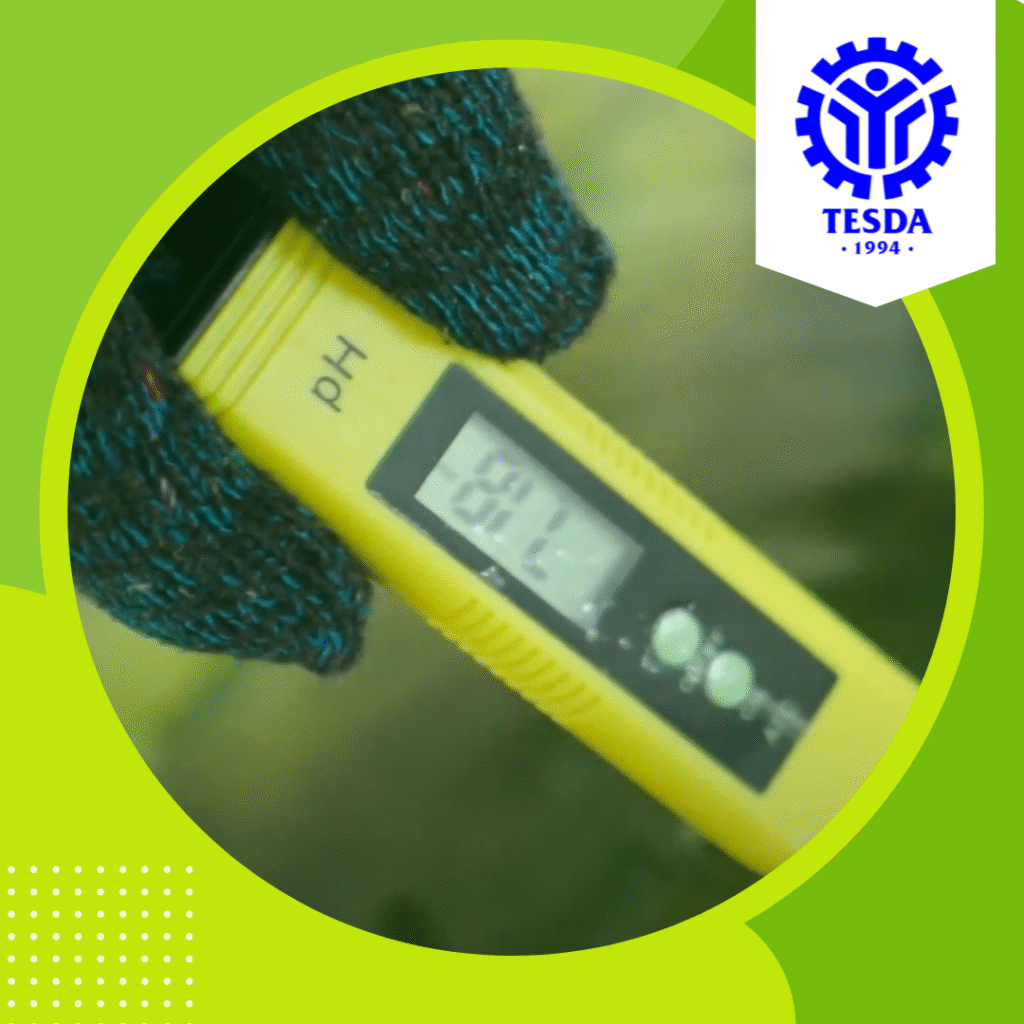
UNIT 1: Management of Aquaponics Systems
Lesson 1: Management of Aquaponic Systems
Lesson 2: Plant Management
Lesson 3: Fish Management
Lesson 4: Routine Management
Upon completion of this unit, the learner will possess the ability to:
- List two common practices of aquaponic management
- Demonstrate seedling transplant to media bed
- Describe the staggered stocking technique
- Enumerate three daily routine activities in maintaining the system
UNIT 2: Integrating Aquaponics
Lesson 1: Sustainable Alternatives for Aquaponics
Lesson 2: Small-scale Unit Water Levels
Lesson 3: Integrating with Other Agriculture Techniques
Lesson 4: Small-scale Aquaponics in Southeast Asia
Upon completion of this unit, the learner will possess the ability to:
- List at least two sustainable alternatives in aquaponics
- Describe the dynamics of water level management in aquaponics
- Describe how aquaponics integrate with similar agriculture techniques
- Describe similar aquaponic practices in nearby Southeast Asia countries
Note: Upon completion of each module or specific modules, you will receive a certificate to acknowledge and showcase your expertise in the subject matter. These certificates serve as a testament to your commitment to continuous learning.
Tips for Aquaponic Food Production
Simple tips for aquaponic food production:
- Regularly test and monitor water parameters like pH, ammonia, and nitrate levels to ensure a healthy environment for fish and plants.
- Select fish species well-suited for aquaponics, such as tilapia or trout. Likewise, choose plants that thrive in nutrient-rich water, like lettuce or herbs.
- Maintain a proper fish-to-plant ratio for adequate nutrient supply and waste management.
- Ensure plants receive enough light for photosynthesis using artificial lighting or placing the system in a location with sufficient sunlight.
- Continuously monitor and adjust the system, including feeding fish, maintaining water temperature, and pruning or harvesting plants.
Start small and gradually expand your aquaponic setup as you gain experience. Enjoy aquaponic food production.
Organic Agriculture Production NC II Online Course
Agriculture plays a vital role in the economy, and the demand for organic products continues to grow. The TESDA Online Program offers the Organic Agriculture Production NC II Online Course to equip students with skills in organic farming, including chicken raising, vegetable production, soil management, and pest control. This course prepares individuals to manage organic farm operations or start their own sustainable farming business, contributing to the growth of the agriculture industry.
Modules
There are 5 modules covered in the Organic Agriculture Production NC II course. These modules are created to provide students with a comprehensive understanding and knowledge of organic agriculture production.
Module 1: Introduction to Organic Agriculture
This module provides the knowledge, skills, and attitudes needed to begin your journey towards obtaining a National Certificate in Organic Agriculture. It covers key aspects including the Organic Agriculture Industry in the Philippines, Fundamentals of Organic Agriculture, and Organic Certification. Completion of this course is a prerequisite for other courses like Raising Organic Chickens, Producing Organic Vegetables, Producing Organic Fertilizers, and Making Organic Concoctions and Extracts.
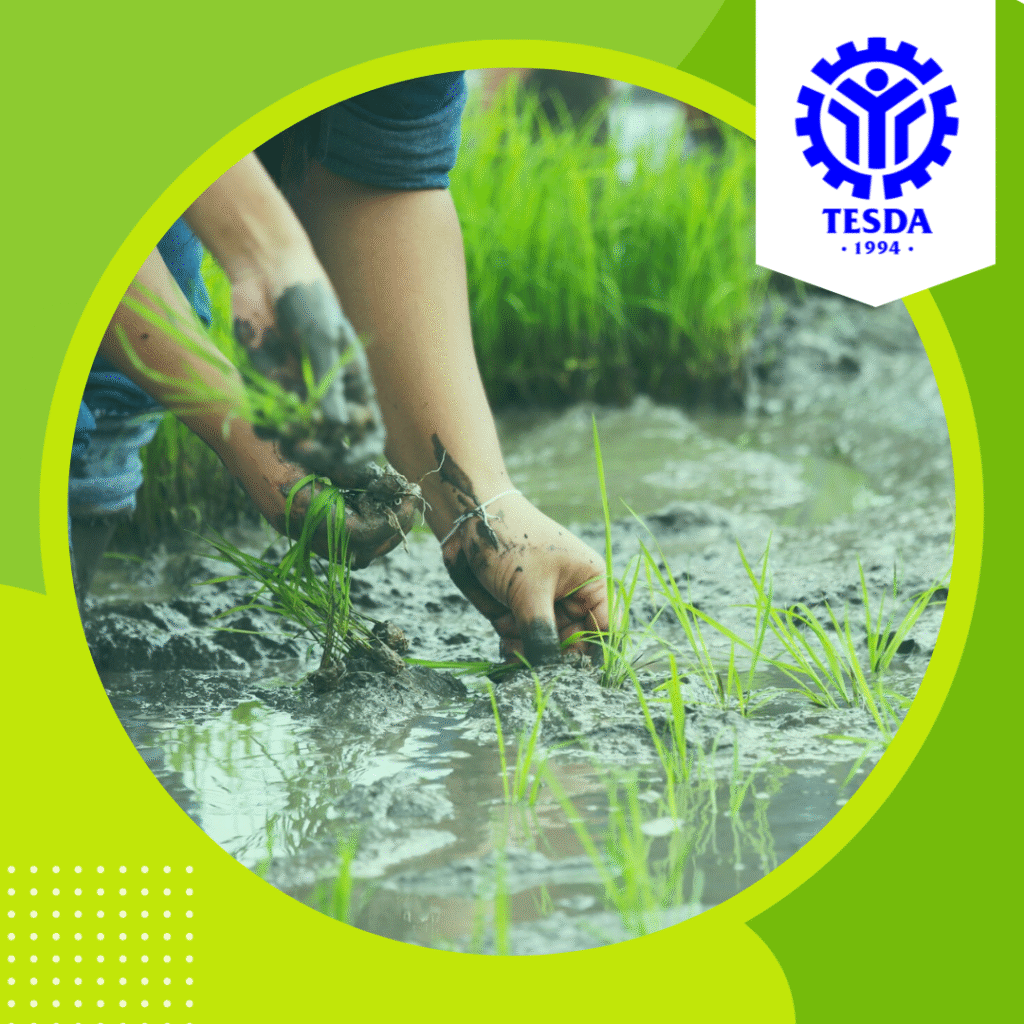
UNIT 1: Organic Agriculture in the Philippines
Lesson 1: What is Organic Agriculture
Lesson 2: The Organic Agriculture Industry
Upon completion of this unit, the learner will possess the ability to:
- Define organic agriculture as a production system
- Explain how organic agriculture addresses the 3 dimensions of sustainability according to FAO
- Explain the 4 models of organic agriculture in the Philippines
- Describe industry sectors, opportunities, and trends
- Apply desirable workplace habits as discussed in this
- Identify laws and ordinances relevant to organic agriculture
- Enumerate sources of information for organic agriculture
UNIT 2: Fundamentals of Organic Agriculture
Lesson 1: Farm Tools, Implement, and Equipment
Lesson 2: Health and Safety Measures in Farm Operation
Lesson 3: Estimation and Basic Calculations in the Farm
Lesson 4: Recordkeeping
Upon completion of this unit, the learner will possess the ability to:
- Enumerate farm tools and equipment
- Familiarize yourself with health and safety procedures in the workplace
- Perform estimation and basic calculation for farm-related problems
- Identify recordkeeping tools used on the farm
UNIT 3: Certification for Organic Agriculture
Lesson 1: What is Certification?
Lesson 2: Certification Procedures
Upon completion of this unit, the learner will possess the ability to:
- Explain the relevance of certification in organic farm production
- Differentiate the 3 types of verification
- Identify the main reference for complying with organic certification
- Enumerate the steps of third-party certification in chronological order
- Identify certification bodies for both local and international markets
Module 2: Formulating Organic Concoctions & Extracts
This module provides the necessary knowledge, skills, and attitude to produce organic concoctions and extracts for personal farm use. It covers procedures for preparing and producing 11 different organic recipes.
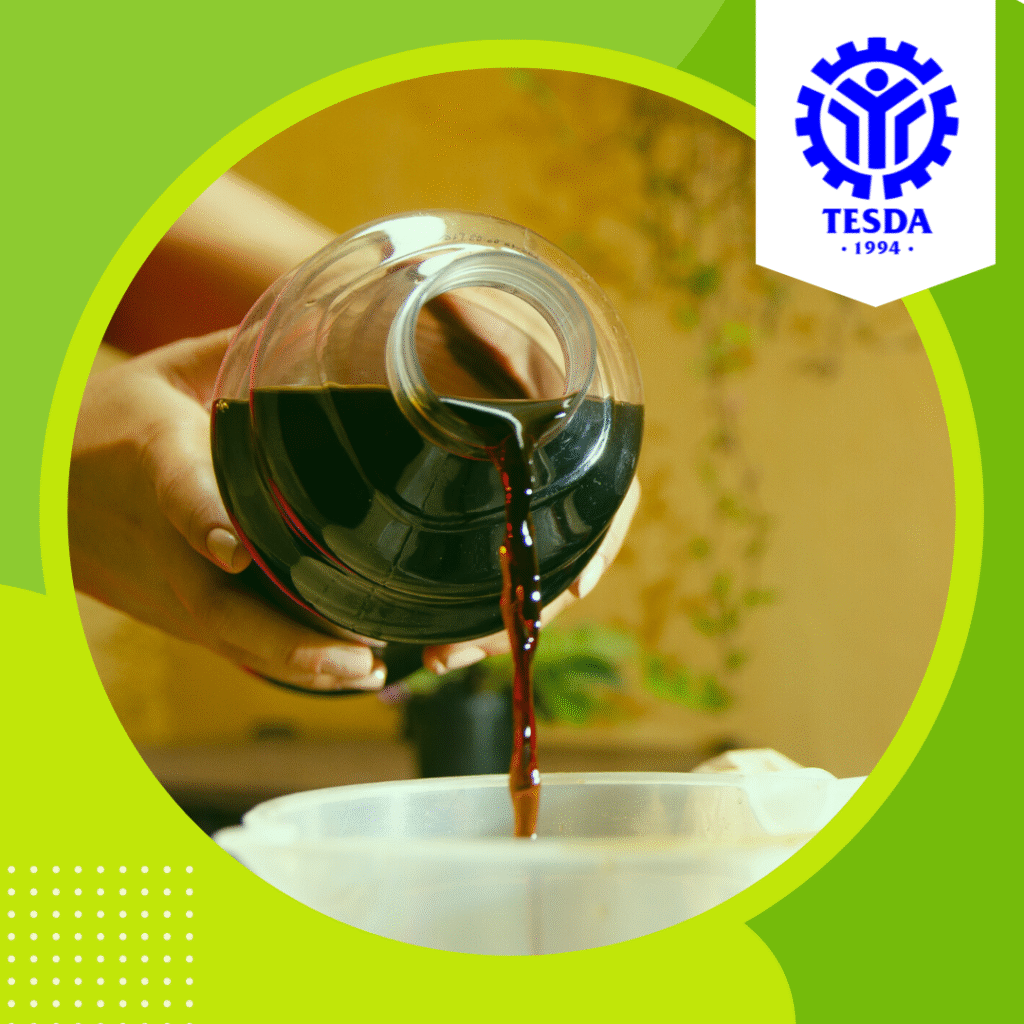
UNIT 1: Introduction to Organic Concoctions and Extracts
Lesson 1: Organic Concoctions and Extracts
Lesson 2: Common Procedures in Formulating Organic Concoctions and Extracts
Upon completion of this unit, the learner will possess the ability to:
- Define organic concoctions and extracts in your own terms.
- Enumerate uses for organic concoctions and extracts.
- Identify common materials in making concoctions and extracts.
UNIT 2: Processing and Packaging Organic Concoctions and Extracts
Lesson 1: Processing Organic Concoctions and Extracts
Lesson 2: Packaging and Storing Organic Concoctions and Extracts
Upon completion of this unit, the learner will possess the ability to:
- Demonstrate the process of making organic concoctions and extracts.
- Apply guidelines for packaging and storing organic concoctions and extracts.
Module 3: Producing Organic Fertilizers
This module provides an overview of producing organic fertilizers, including tasks like preparing compost sites, handling raw materials, implementing composting methods, and harvesting compost. It specifically focuses on the production of dry organic soil amendments.
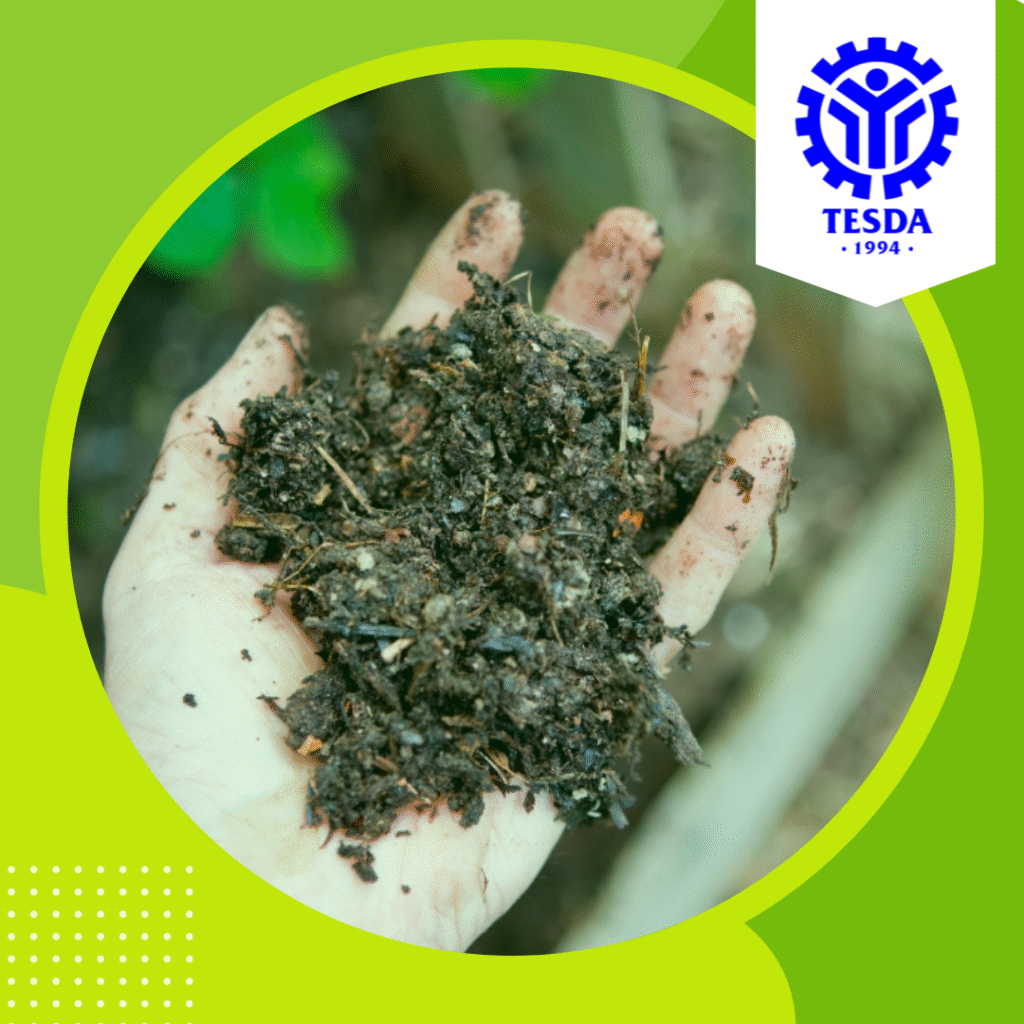
UNIT 1: Introduction to Organic Fertilizer Production
Lesson 1: Organic Fertilizers
Lesson 2: Essential Plant Nutrients and their Sources
Upon completion of this unit, the learner will possess the ability to:
- Describe the 17 essential plant nutrients
- Explain the importance of soil fertility
- Enumerate ways to improve soil fertility
UNIT 2: Producing Organic Fertilizers
Lesson 1: Preparing for Organic Fertilizer Production
Lesson 2: Methods of Composting
Lesson 3: Harvesting Compost Fertilizers
Lesson 4: Other Organic Fertilizers
Upon completion of this unit, the learner will possess the ability to:
- Identify a site for compost fertilizer production
- Explain the 6 factors that affect the rate of composting
- Describe the 4 activities in preparing raw materials for composting
- Compute for fertilizer production requirements
- Perform at least one method of composting
- Describe the 5 activities in harvesting compost fertilizer
- Demonstrate the production of at least one organic fertilizer aside from composting
Module 4: Producing Organic Vegetables
This module covers establishing a nursery, planting seedlings, plant care, and harvest and post-harvest techniques.
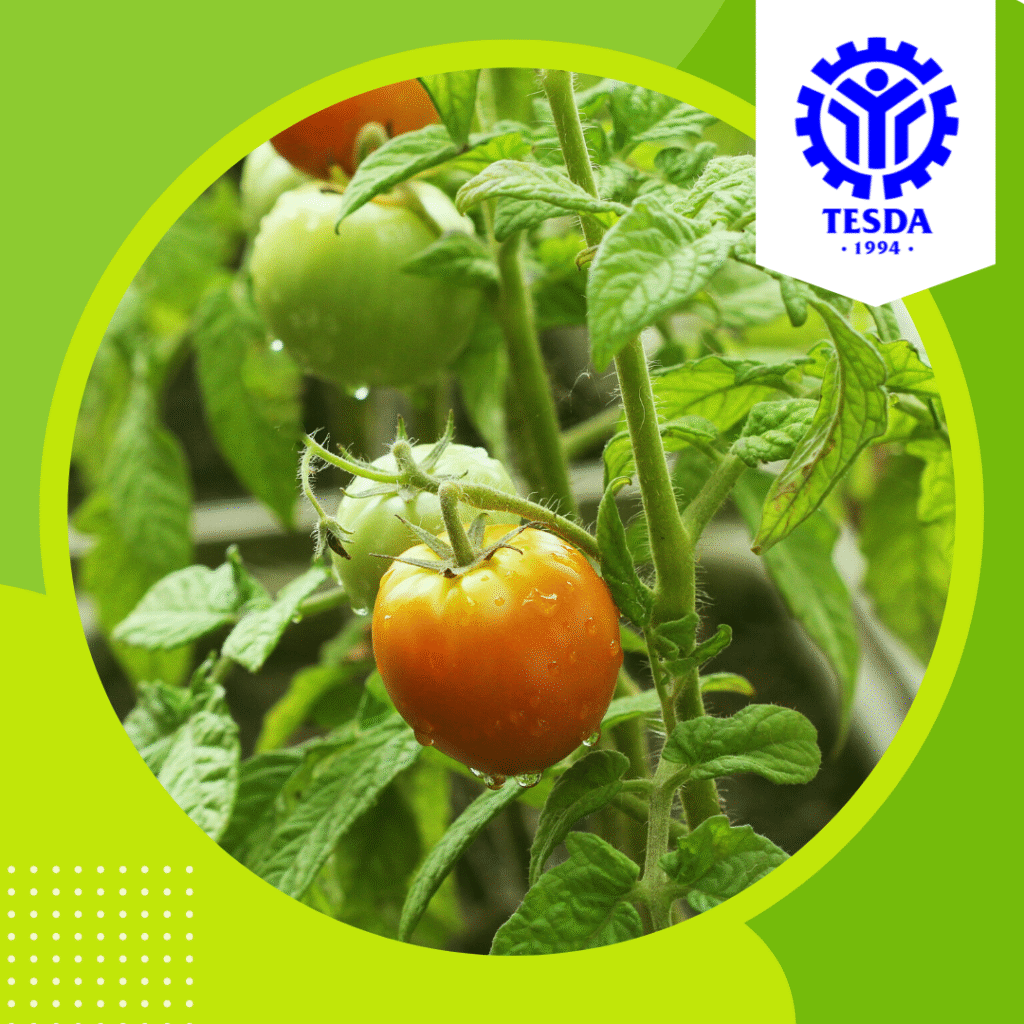
UNIT 1: Introduction to Organic Vegetable Production
Lesson 1: Classifications of Vegetables
Lesson 2: Basics of Vegetable Growth
Upon completion of this unit, the learner will possess the ability to:
- Classify vegetables based on climate, edible parts, and duration of life cycle;
- Explain the 5 major requirements for the growth of vegetables;
- Describe the stages of vegetable growth
UNIT 2: Growing and Harvesting Organic Vegetables
Lesson 1: Establishing the Nursery
Lesson 2: The Greenhouse
Lesson 3: Planting the Seedlings
Lesson 4: Caring for Organic Vegetables
Lesson 5: Harvesting Organic Vegetables
Upon completion of this unit, the learner will possess the ability to:
- Illustrate a sample layout for a plant nursery
- Explain the requirements for planting and caring for seeds
- Describe procedures in land preparation
- Enumerate techniques in plant care and management
- Enumerate harvest and post-harvest activities
Module 5: Raising Organic Chickens
This module provides comprehensive guidance on efficiently and effectively raising organic chickens. It covers various aspects such as selecting healthy stocks, choosing suitable materials and equipment for chicken houses, installing brooding facilities, managing chicken health and growth, and harvesting broilers and layers.
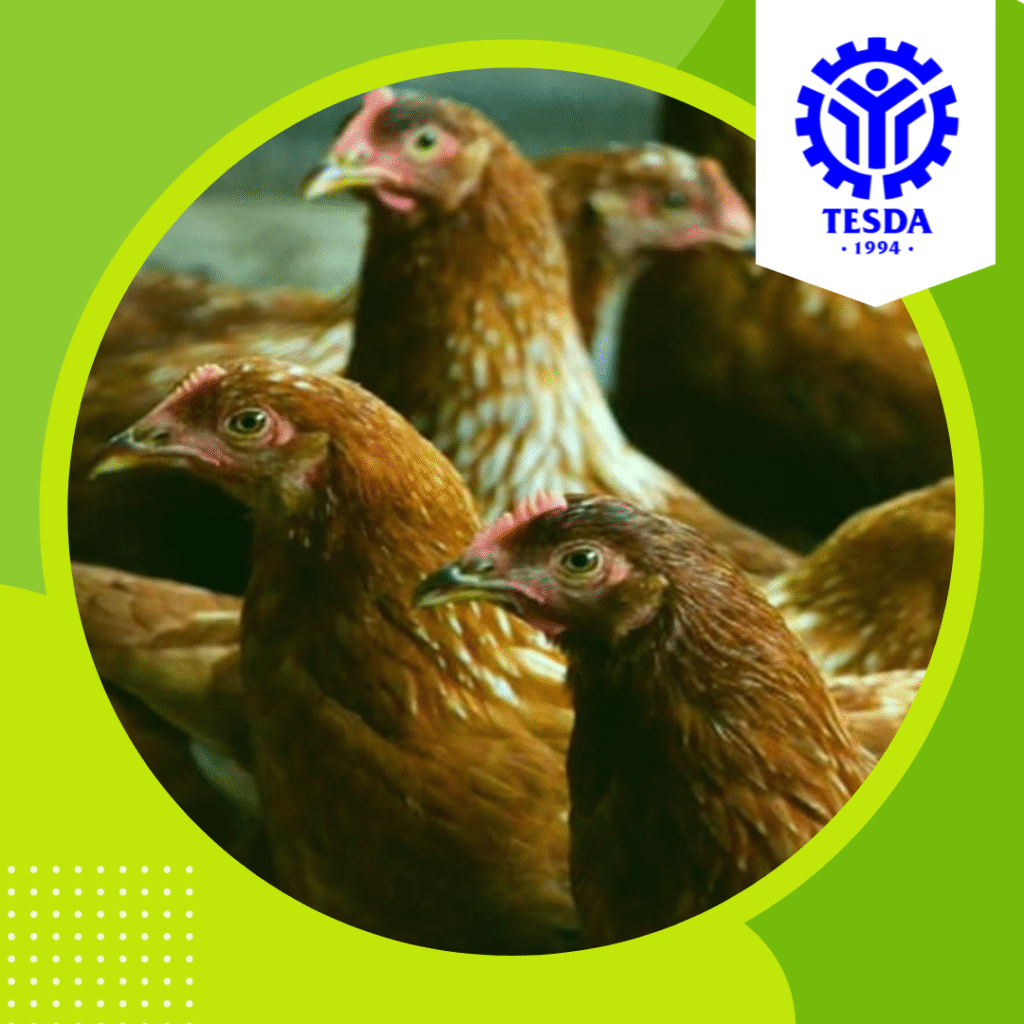
UNIT 1: Introduction to Organic Chicken Production
Lesson 1: Selecting Healthy Stocks
Lesson 2: Setting Up a Poultry House
Upon completion of this unit, the learner will possess the ability to:
- Identify the external parts of a chicken
- Classify chickens based on origin, breed, and utilization
- Describe the life cycle of a chicken
- Recognize the qualities of healthy chicks and pullets
- Describe the types of poultry houses
- Explain the requirements for a chicken’s housing
- Describe the features of an ideal broiler or layer house
UNIT 2: Growing and Harvesting the Chickens
Lesson 1: Feeding the Chickens
Lesson 2: Growing the Chickens
Lesson 3: Harvesting the Chickens
Upon completion of this unit, the learner will possess the ability to:
- Enumerate sources of feed for animal nutrition
- Identify substances that are prohibited in feed formulation
- Formulate feeds based on the nutritional requirements of chickens
- Explain the systems of feeding in poultry production
- Explain the concept of brooding
- Summarize the pointers in growing layers and broilers
- Enumerate health management practices on the farm
- Describe the process of cleaning and sanitizing housing structures
- Identify the activities in harvesting layers and broilers
Note: Upon completing modules, or specific ones, you’ll receive a certificate to acknowledge your achievements and showcase your expertise. These certificates validate your dedication to continuous learning.
Agricultural Crops Production NC II Online Course
The course is now available online to cater learners who want to learn the skills without leaving their homes. Agricultural Crops Production NC II is a short course offered aims to equip learners with the knowledge and skills in producing high-quality agricultural crops.
Modules
There are 5 modules covered in the Agricultural Crops Production NC II. These modules are designed to provide comprehensive knowledge and skills in the field of agriculture, specifically on crop production. Each module is carefully curated to cover different topics and techniques necessary for a successful career in this industry.
Module 1: Introduction to Agricultural Crops Production
This module teaches you important things you need to know, like knowledge, skills, and attitude, before you can work in the agricultural crop production sector. It’s like getting ready to become a pro in growing crops!
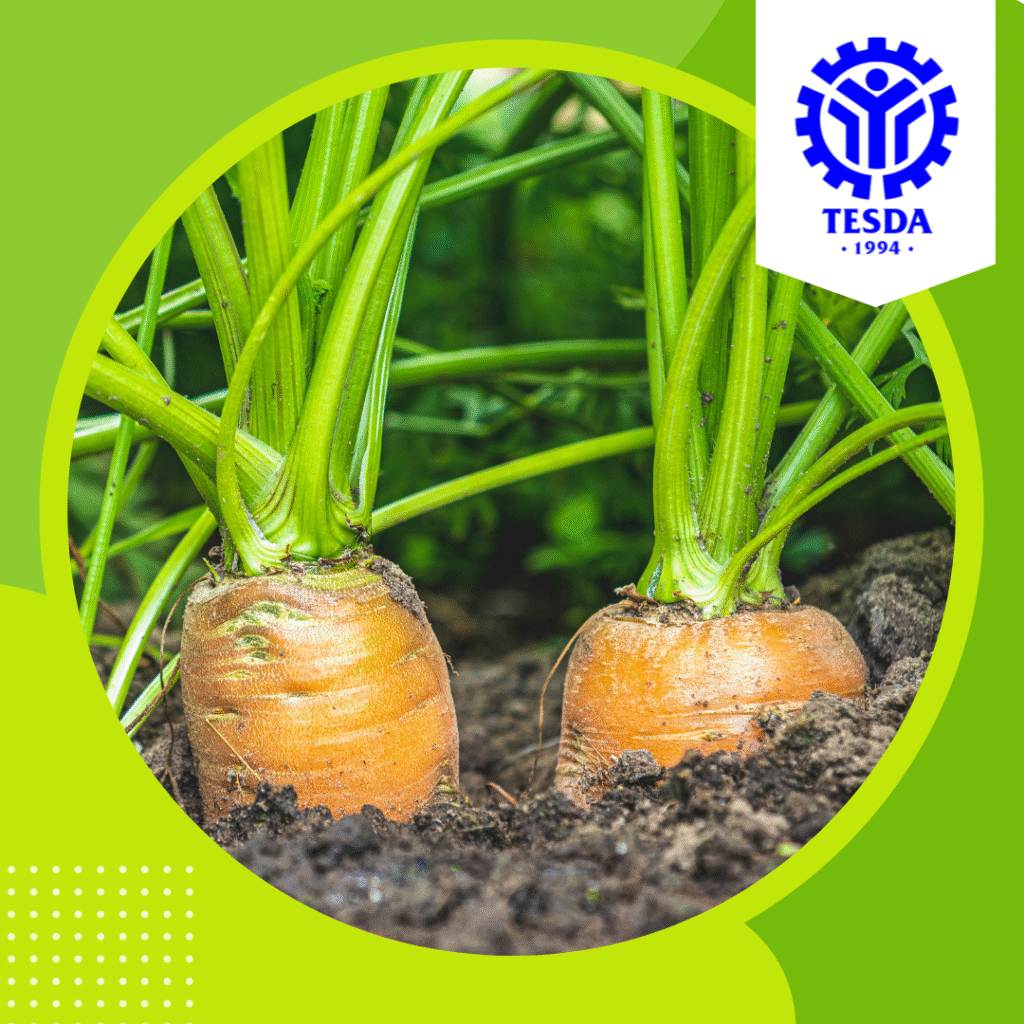
UNIT 1: Working in the Agri Crops Production Sector
Lesson 1: What is Agricultural Crops Production?
Lesson 2: Agriculture in the Philippines
Lesson 3: Phases of Agricultural Crops Production
Upon completion of this unit, the learner will possess the ability to:
- Explain the relevance of agricultural crop production in the agriculture sector
- Determine the qualities of a farm worker
- Explain the various agricultural phases
UNIT 2: Fundamentals of Agri Crops Production
Lesson 1: Common Agricultural Crops
Lesson 2: Farm Tools, Implement, and Equipment
Lesson 3: Occupational Health and Safety Measures in Farm Operations
Lesson 4: Estimation and Basic Calculations in the Farm
Lesson 5: Recordkeeping
Upon completion of this unit, the learner will possess the ability to:
- Determine the different types of common crops in the Philippines
- Identify essential farm tools, implements, and equipment
- Practice the need for occupational health and safety measures
- Perform basic calculations and record-keeping
Module 2: Performing Nursery Operations
This module teaches you everything you need to know about taking care of nurseries and plants. You’ll learn the important knowledge, skills, and attitudes required to perform nursery operations and procedures. It’s like becoming a plant expert!
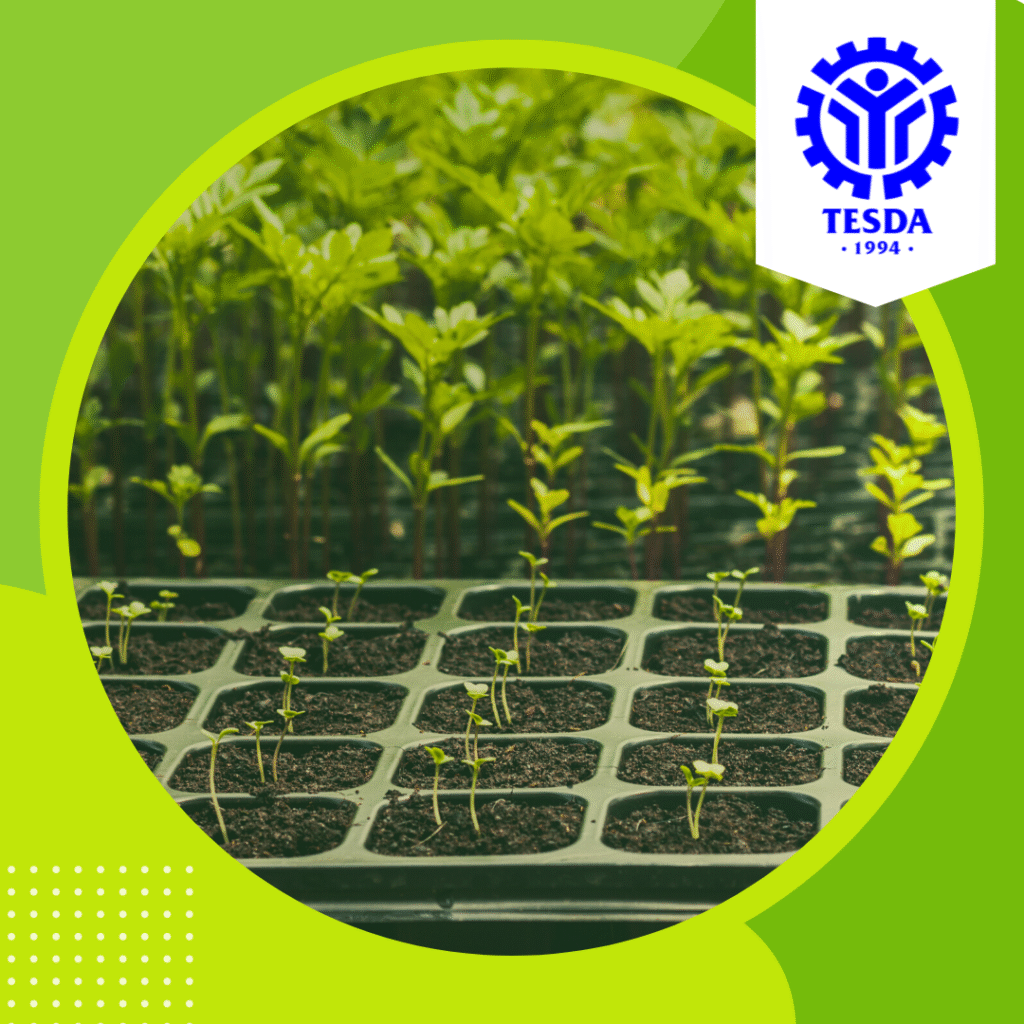
UNIT 1: Selecting Planting Materials
Lesson 1: Kinds and Varieties of Planting Materials
Lesson 2: Conducting Seed Testing
Upon completion of this unit, the learner will possess the ability to:
- Determine the kinds and varieties of planting materials;
- Perform procedures for conducting seed testing; and
- Demonstrate procedures for breaking seed dormancy.
UNIT 2: Preparing Growing Media
Lesson 1: Types of Growing Media
Lesson 2: Preparing the Seedbed
Upon completion of this unit, the learner will possess the ability to:
- Determine the characteristics of Growing Media;
- Prepare the growing media according to plant requirements
- Prepare the seedbed for seed germination.
UNIT 3: Performing Plant Propagation Techniques
Lesson 1: Setting up and Maintaining the Nursery Facilities
Lesson 2: Performing Sexual Plant Propagation
Lesson 3: Performing Asexual Plant Propagation
Upon completion of this unit, the learner will possess the ability to:
- Identify the different set-up of the Nursery Shed
- Select quality seedlings
- Identify the different asexual propagation techniques
- Maintain germinated seedlings until fully established
- Perform pricking and thinning of seedlings
Module 3: Planting Crops
This module teaches you everything you need to know about planting different crops on a farm. You’ll learn the knowledge, skills, and attitude required to grow various agricultural plants successfully.
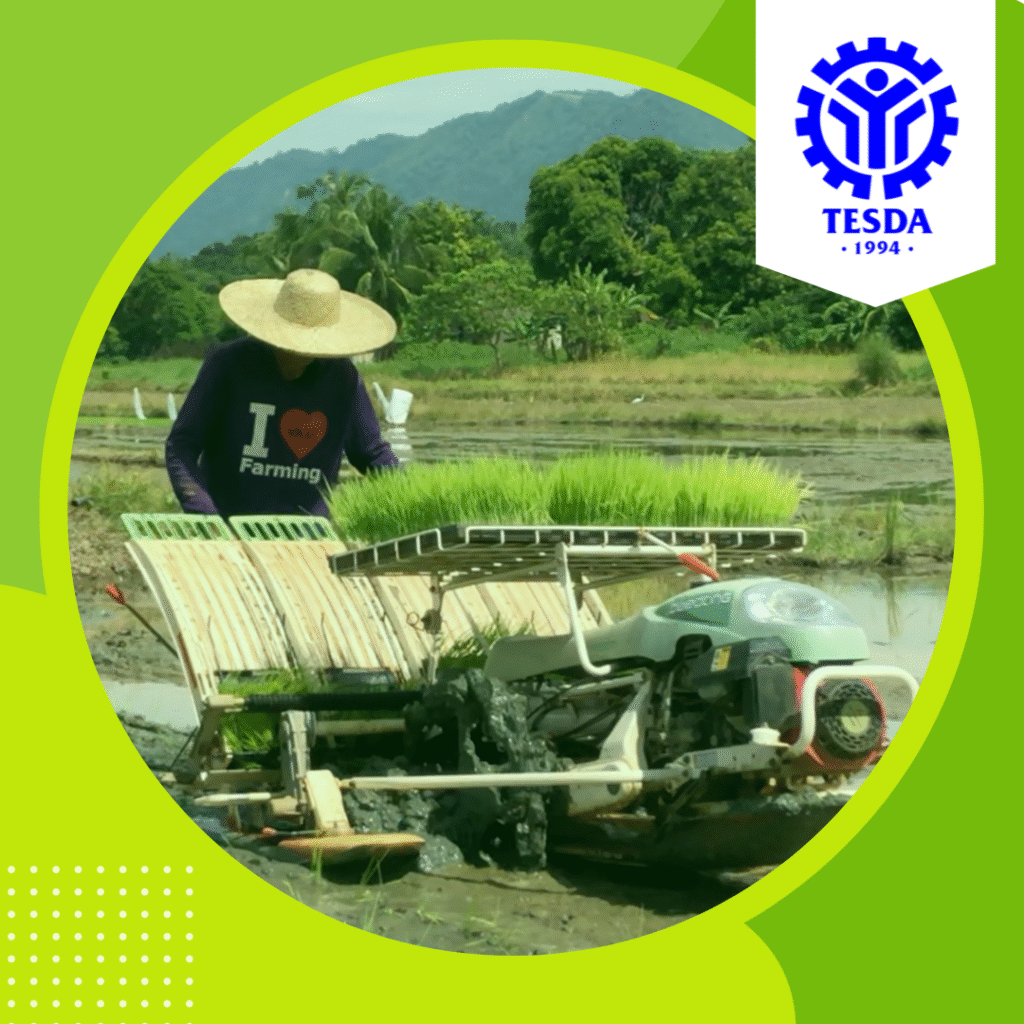
UNIT 1: Preparing the Land for Planting
Lesson 1: Land Preparation Activities
Lesson 2: Conducting Field Lay Out (Types of Planting System)
Lesson 3: Digging Holes
Upon completion of this unit, the learner will possess the ability to:
- Perform basic methods of land preparation
- Conduct soil sampling using a Soil Testing Kit (STK)
- Interpret field layout plan according to the recommended planting system
- Perform digging of holes and application of basal fertilizer
UNIT 2: Performing Direct Seeding and Transplanting
Lesson 1: Sowing Seeds
Lesson 2: Transplanting Seedlings
Upon completion of this unit, the learner will possess the ability to:
- Plant seeds according to the recommended rate, distance, and depth
- Recognize ways of handling seedlings from the nursery
- Identify different transplanting methods for seedlings based on crop practices
Module 4: Caring and Maintaining Crops
This module teaches you everything you need to know about taking care of plants. You’ll learn important skills and the right attitude to keep plants healthy and thriving.
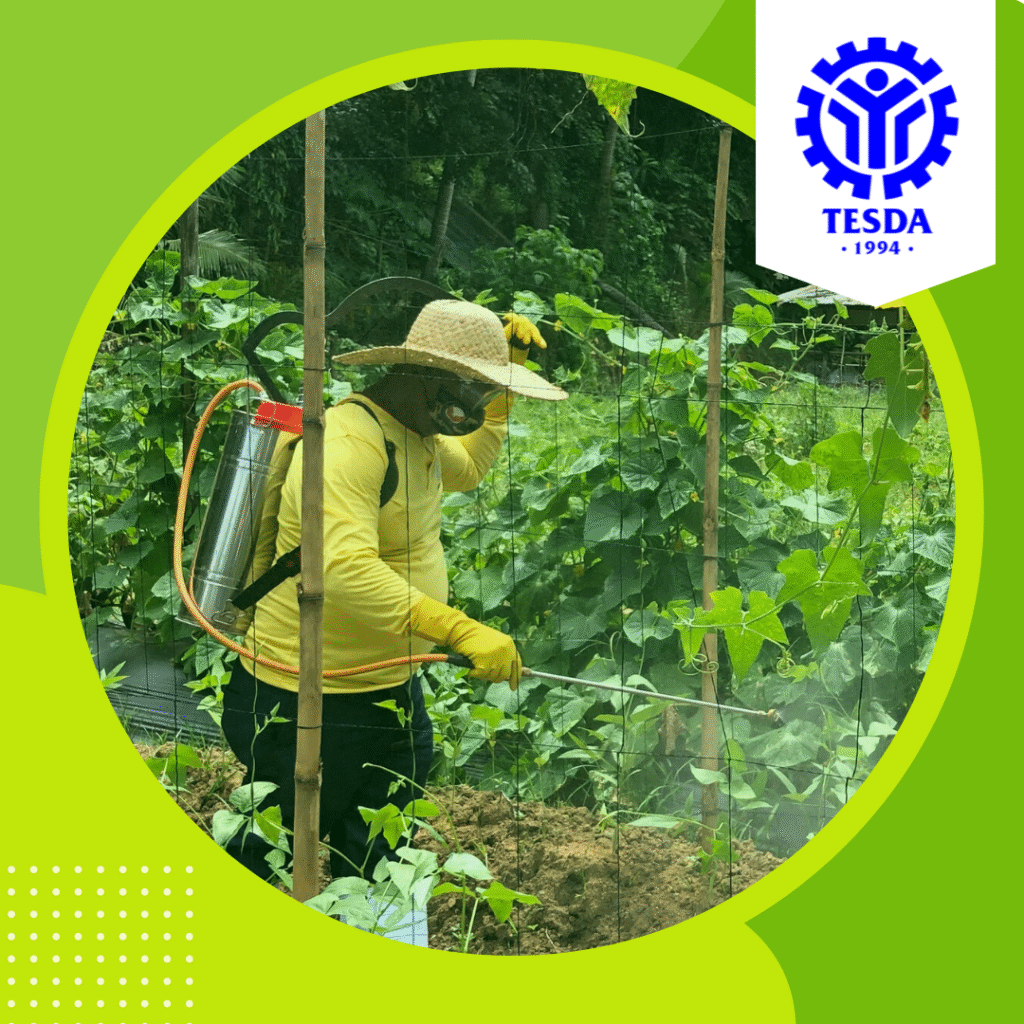
UNIT 1: Applying Pest Control Measures
Lesson 1: Types of Pests
Lesson 2: Monitoring Pest Incidence
Lesson 3: Applying Pest Control Measures
Upon completion of this unit, the learner will possess the ability to:
- Determine the types of pests on the farm
- Identify the damages done by different types of pests
- Perform necessary pest control measures
- Explain Integrated Pest Management
UNIT 2: Applying Fertilizer
Lesson 1: Determining Plant Nutrient Requirements
Lesson 2: Kinds and Composition of Fertilizers
Lesson 3: Methods of Fertilizer Application
Upon completion of this unit, the learner will possess the ability to:
- Identify essential plant nutrients
- Differentiate macro- and micro-nutrients
- Calculate fertilizer application rates
- List fertilizer application methods
UNIT 3: Watering Crops
Lesson 1: Determining Soil Moisture
Lesson 2: Irrigation Systems
Upon completion of this unit, the learner will possess the ability to:
- Describe the significance of soil moisture
- Measure soil moisture
- Perform irrigation
UNIT 4: Performing Physical Growth Enhancing Practices
Lesson 1: Performing Pruning
Lesson 2: Cultivation and Rejuvenating Activities
Lesson 3: Growth Training Techniques
Lesson 4: Mulching Techniques
Upon completion of this unit, the learner will possess the ability to:
- Demonstrate pruning techniques
- Demonstrate cultivation and rejuvenating activities
- Identify growth training techniques
- Differentiate two types of mulching
Module 5: Performing Harvest and Postharvest Operations
This module teaches you everything you need to know about harvest and postharvest operations. You’ll learn important skills, gain knowledge, and develop the right attitude to perform these tasks successfully.
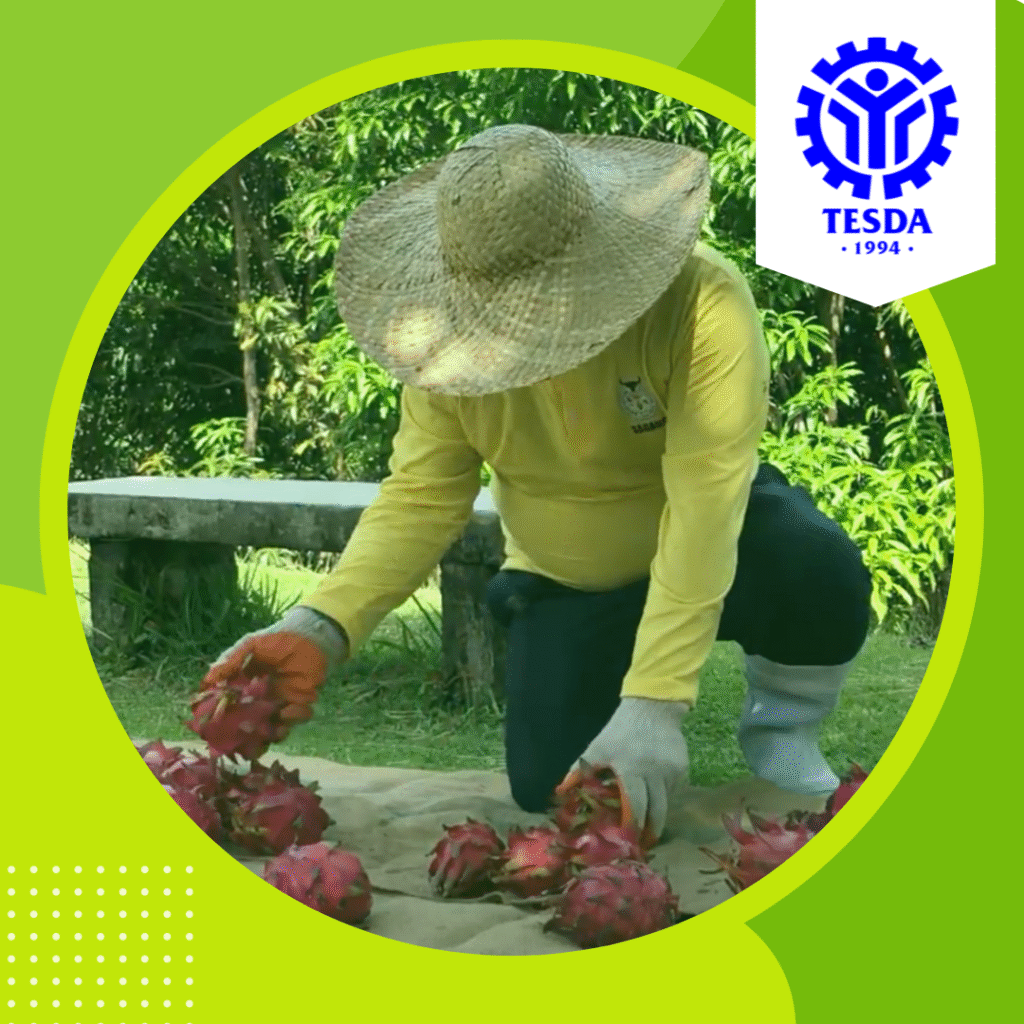
UNIT 1: Determining Crop Maturity
Lesson 1: Determining Crop Maturity
Lesson 2: Pre-Harvest Activities
Upon completion of this unit, the learner will possess the ability to:
- Identify the different crop maturity indices
- Recognize the different records of crop agronomic history
- Remove obstructions from the field for efficient harvesting
- Familiarize harvesting and post-harvesting tools and materials
UNIT 2: Performing Harvest
Lesson 1: Harvesting Methods
Lesson 2: Quality of Crops
Upon completion of this unit, the learner will possess the ability to:
- Identify appropriate harvesting methods based on common cultural practices;
- Recognize the characteristics of a quality produce
- Harvest crops based on maturity indices and characteristics affecting harvest quality
- Apply Good Agricultural Practices during the harvest
UNIT 3: Performing Post-Harvest Operations
Lesson 1: Common Post-Harvest Treatments
Lesson 2: Conducting Post-Harvest Operations
Lesson 3: Monitoring and Assessing Damages in Crops
Note: Upon completion of each module, or specific modules, you will be awarded a certificate to recognize your achievements and demonstrate your expertise in the respective subject matter. These certificates serve as a testament to your dedication and commitment to continuous learning.
Fruit Growing
Growing fruit takes knowledge and effort, not just planting a seed. That’s why TESDA offers the Fruit Grower Online Course, covering everything from site preparation to harvesting. Accessible through the TESDA Online Program, it’s perfect for those looking to expand their skills or start a new career in agriculture. Learn to grow nutritious fruit while supporting the nation’s agriculture industry.
Units Covered in Fruit Grower
There are 6 units covered in the Fruit Grower course, each with its specific topic. These units are designed to provide learners with comprehensive knowledge and skills needed for fruit production.
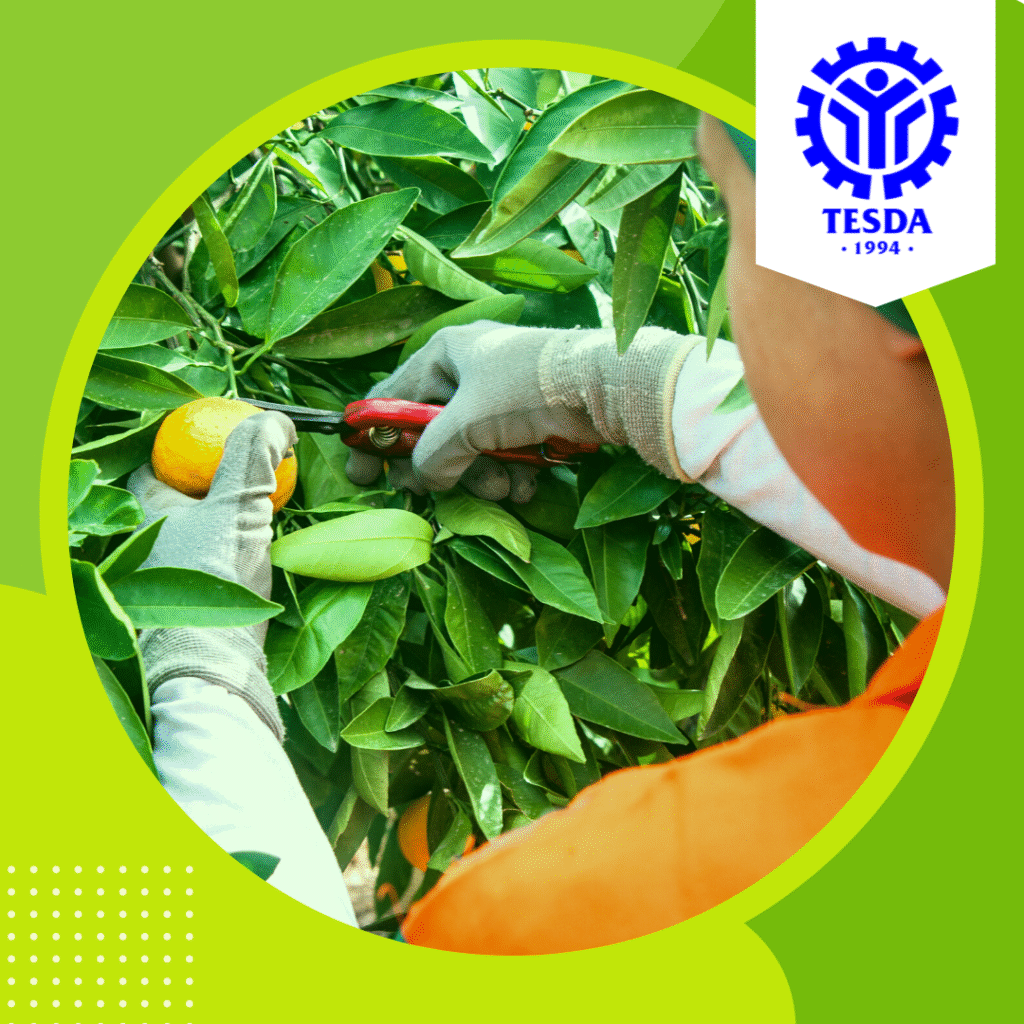
Unit 1: Preparing the Site for Planting Fruit Trees
Lesson 1: Assessing the Site for Planting Fruit Trees
Lesson 2: Staking the Site
Lesson 3: Digging Holes
Lesson 4: Installing an Irrigation System
Unit 2: Growing Fruit Seedlings
Lesson 1: Creating Media Components and Mixes
Lesson 2: Treating Seeds for Germination
Lesson 3: Growing Fruit Seedlings
Unit 3: Growing the Fruit Trees
Lesson 1: Applying Basal Fertilizer
Lesson 2: Transplanting Seedlings
Lesson 3: Covering the Root System
Lesson 4: Watering Newly Transplanted Seedlings
Lesson 5: Performing Top Pruning
Unit 4: Monitoring Plant Growth
Lesson 1: Performing Weeding Activities
Lesson 2: Applying Fertilizer
Lesson 3: Applying irrigation
Lesson 4: Pruning
Lesson 5: Applying tar and paints
Lesson 6: Applying flower inducer
Lesson 7: Department of Agriculture (DA) Codes and Regulations
Lesson 8: Integrated Pest Management
Unit 5: Harvesting Fruit
Lesson 1: Fruit Maturity Indicators
Lesson 2: Harvesting Methods
Lesson 3: Harvesting Materials and Tools
Lesson 4: Demonstrating How to Harvest Fruits
Unit 6: Post Harvest Operations
Lesson 1: Cleaning Harvesting Tools
Lesson 2: Procedures Post-Harvest Operations
Lesson 3: Maintaining Quality of Fruits
Note: TESDA is enhancing the Training for Work Scholarship Program (TOP) by introducing pre and post tests. Completion of these tests is required to obtain a Certificate of Completion, guaranteeing program excellence.
To learn how to enroll in the TESDA Online Program (TOP), click HERE.
Summary
TESDA Agriculture Online Courses offer valuable education and training for those pursuing a career in the agriculture industry, covering topics like pest management, crop production, and post-harvest operations. These flexible courses allow students to learn at their own pace, making education more accessible, especially for those unable to attend traditional classes. By enhancing specific skills, participants can become more competitive in the job market or even start their own agricultural businesses. With technology improving efficiency and sustainability gaining focus, these courses also emphasize modern farming practices that conserve resources, reduce chemical use, and promote biodiversity, aligning with the future needs of the agricultural sector.

